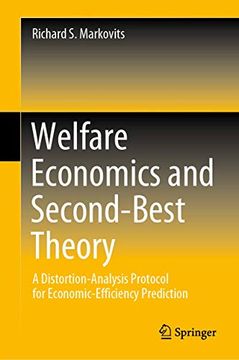Share
Welfare Economics and Second-Best Theory: A Distortion-Analysis Protocol for Economic-Efficiency Prediction
Richard S. Markovits (Author)
·
Springer
· Hardcover
Welfare Economics and Second-Best Theory: A Distortion-Analysis Protocol for Economic-Efficiency Prediction - Richard S. Markovits
£ 58.49
£ 64.99
You save: £ 6.50
Choose the list to add your product or create one New List
✓ Product added successfully to the Wishlist.
Go to My WishlistsIt will be shipped from our warehouse between
Wednesday, July 10 and
Friday, July 12.
You will receive it anywhere in United Kingdom between 1 and 3 business days after shipment.
Synopsis "Welfare Economics and Second-Best Theory: A Distortion-Analysis Protocol for Economic-Efficiency Prediction"
This book examines the implications of The General Theory of Second Best for analyzing the economic efficiency of non-government conduct or government policies in an economically efficient way. It develops and legitimates an economically efficient economic-efficiency-analysis protocol with three unique characteristics: First, the protocol focuses separately on each of a wide variety of categories of economic inefficiency, many of which conventional analyses ignore. Second, it analyzes the impact of conduct or policies on each of these categories of economic inefficiency, primarily by predicting the respective conduct’s/policy’s impact on the distortion that the economy’s various Pareto imperfections generate in the profits yielded by the resource allocations associated with the individual categories of economic inefficiency―i.e., on the difference between their profitability and economic efficiency. And third, it is third-best―i.e., it instructs the analyst to execute a theoretical or empirical research project if and only if the economic-efficiency gains the project is expected to generate by increasing the accuracy of economic-efficiency conclusions exceed the predicted allocative cost of its execution and public financing. The book also uses the protocol to analyze the economic efficiency of specific policies so as to illustrate both how it differs from the protocols that most applied welfare economists continue to use and how its conclusions differ from those produced by standard analysis.
- 0% (0)
- 0% (0)
- 0% (0)
- 0% (0)
- 0% (0)
All books in our catalog are Original.
The book is written in English.
The binding of this edition is Hardcover.
✓ Producto agregado correctamente al carro, Ir a Pagar.

